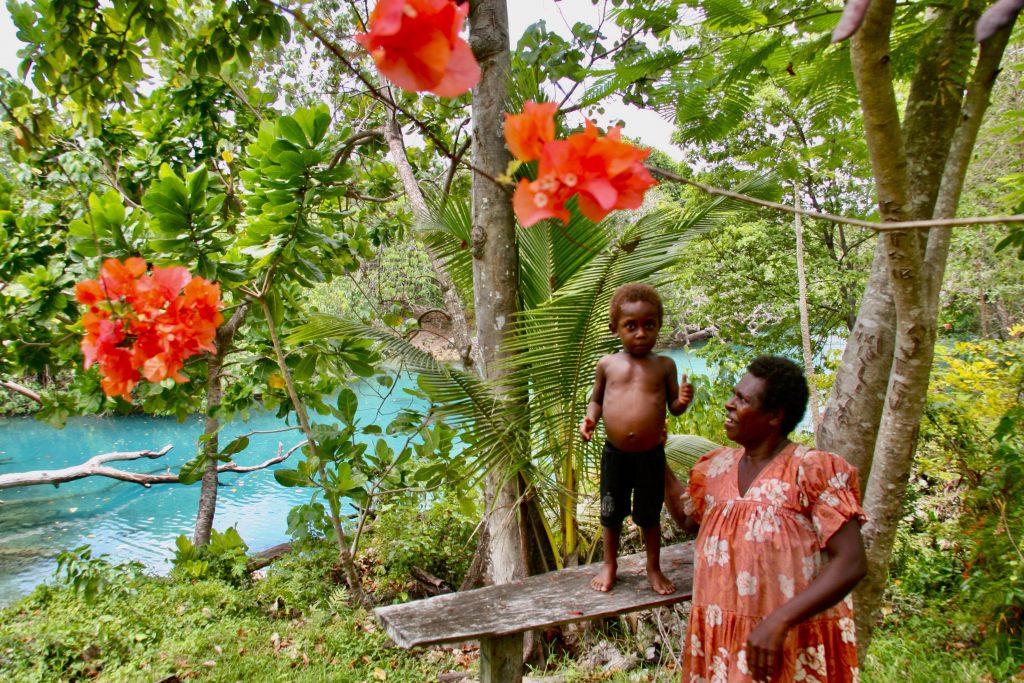
VANUATU
From a European point of view even getting to Fiji sounded quite like a trek. If Fiji was remote, Tuvalu was another planet. There were only three weekly flights from Fiji to Tuvalu, its only connection to the outside world. For three hours, until the lagoon landscape of Tuvalu came into sigh, and the plane was circling down towards the narrow stretch of land, I saw nothing but water. Landing on Funafuti, Tuvalu’s main island, already set the tone. Space was quite scarce, Funafuti being just 8km white and rarely more than 100m wide, and the temperatures were like in a tropical sauna. Air condition on Tuvalu was rare. Everything going on on the island seemed to happen where space was relatively abundant and ventilation good: thus on the tarmac of the airport. When in Rome do as the Romans do – I spent half of my time in Tuvalu on the tarmac: I watched baseball and football games and community meetings happening on the tarmac, I strolled along the entire tarmac, I ate my lunch there (Chinese seafood), I saw lovers kissing in the shadows of the night on the tarmac and I saw locals spending their night on their sleeping pads – of course on the tarmac.
After two airport days I decided I had to do something else. I hired a boat and asked my captain too maroon me on palm-fringed atoll, as far away from Funafuti for a true Robinson-Crusoe feeling as possible. After we had left the harbour area we suddenly had three temporary travel companions: dolphins. An hour and a half later the engine noise lowered and I got what I was not any more fully sure that I really wanted it. We had arrived at a little atoll, hardly bigger than a volleyball pitch with maybe a dozens palm trees on it, surrounded by beautiful white sand and the endless blue of the Pacific Ocean. The captain left with the promise of his return to pick me up 5 hours later. The sun already stood high on the horizon when my castaway experiment started. Unlike the challenges of Robinson there were no mutineers, no captives, no cannibals on my island, just one carnivore. Here I was, with 2 liter bottles of water, sunscreen, no bible, but a book with a title I found appropriate: Islomania. I first sat down into the sand, it became too hot, I took a dip into the crystalline waters, being glad there was nothing dangerous in the water. I left the cooling water, tried to find some shadow between the palm trees, not before checking what was in the woods. Despite the sound of the ocean it felt eerily quiet. I read a bit in my book learning that islands and islanders were peculiar places and people, so that islands were way more prone to wars than mainlands. I thought about the world, my travels, my wife, my mother, my family, my friends, my travels, my craziness, I again went into the water, I circumnavigated the island first by swimming, then several times (I did not count) by foot, again and again. I thought about having a nap but I couldn’t sleep. I finally pondered about Robinson who had to endure 28 years, not just 5 hours. The longer and the more often I thought about the probability of my captain really coming back the more uncomfortable the more my experiment went sour. Honestly, my heart bursted into joy when my captain appeared on the horizon already after 4 hours. With a smile he told me he thought I might have been bored in the meantime… How happy and relieved I was returning to Funafuti. Its harbour suddenly felt almost busy albeit just one fisherman was ploughing the turquoise waters from one end to the other. His tshirt looked highly familiar, reading “I love New York”. Me too.
Flat as a pancake on each of the nine islands, Tuvalu nowadays is widely considered as one of the first countries likely to be significantly impacted by rising sea levels. However, when I was visiting in 2010 the climate crisis had not yet fully arrived on people’s minds. Instead I saw the representative of Taiwan driving up and the down the only road stretch in his 1CD car (one out of maybe 5 on the entire island) from one end to the other of Funafuti, several times on the very same day. Tuvalu then mainly benefitted from two main kinds of income: Development aid from Taiwan and commissions from selling the heavily-sought suffix .tv to media corporations.
Three days after my arrival on Tuvalu, it was again landing day, also the day of my departure. Excitement was in the air, everybody seemed to flock to the airport, to witness something special. I was walking a few hundred meters from my little hotel to the little hut called terminal, as the Air Pacific aircraft was already circling above. A fire engine truck was playing loudly its siren to tell that it was now not the right time to sit, eat, play or make love on the tarmac.
